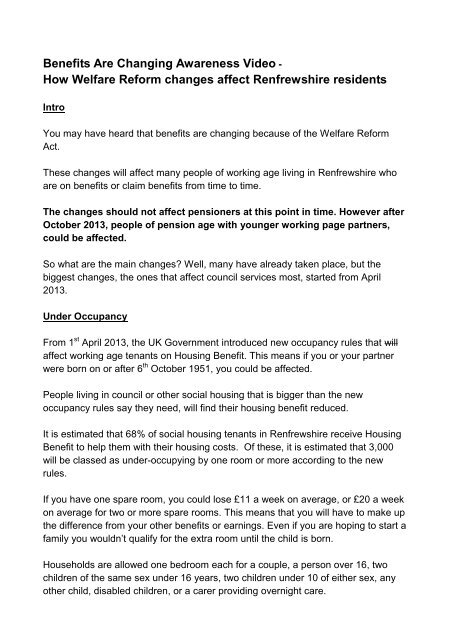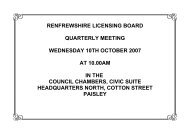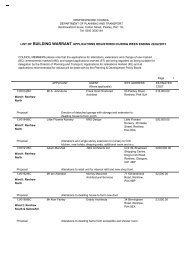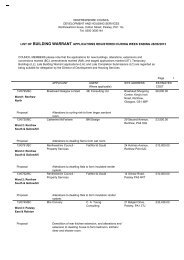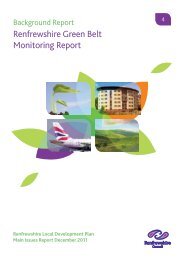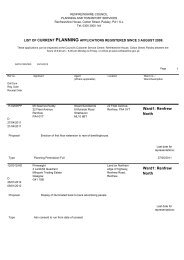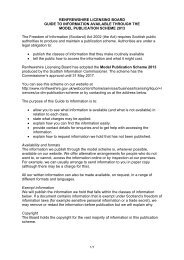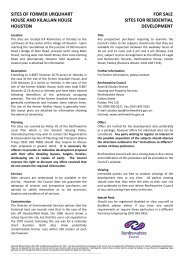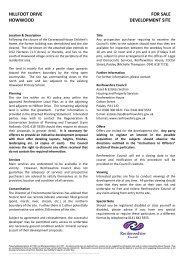transcript of this video - Renfrewshire Council
transcript of this video - Renfrewshire Council
transcript of this video - Renfrewshire Council
You also want an ePaper? Increase the reach of your titles
YUMPU automatically turns print PDFs into web optimized ePapers that Google loves.
Benefits Are Changing Awareness Video -<br />
How Welfare Reform changes affect <strong>Renfrewshire</strong> residents<br />
Intro<br />
You may have heard that benefits are changing because <strong>of</strong> the Welfare Reform<br />
Act.<br />
These changes will affect many people <strong>of</strong> working age living in <strong>Renfrewshire</strong> who<br />
are on benefits or claim benefits from time to time.<br />
The changes should not affect pensioners at <strong>this</strong> point in time. However after<br />
October 2013, people <strong>of</strong> pension age with younger working page partners,<br />
could be affected.<br />
So what are the main changes? Well, many have already taken place, but the<br />
biggest changes, the ones that affect council services most, started from April<br />
2013.<br />
Under Occupancy<br />
From 1 st April 2013, the UK Government introduced new occupancy rules that will<br />
affect working age tenants on Housing Benefit. This means if you or your partner<br />
were born on or after 6 th October 1951, you could be affected.<br />
People living in council or other social housing that is bigger than the new<br />
occupancy rules say they need, will find their housing benefit reduced.<br />
It is estimated that 68% <strong>of</strong> social housing tenants in <strong>Renfrewshire</strong> receive Housing<br />
Benefit to help them with their housing costs. Of these, it is estimated that 3,000<br />
will be classed as under-occupying by one room or more according to the new<br />
rules.<br />
If you have one spare room, you could lose £11 a week on average, or £20 a week<br />
on average for two or more spare rooms. This means that you will have to make up<br />
the difference from your other benefits or earnings. Even if you are hoping to start a<br />
family you wouldn’t qualify for the extra room until the child is born.<br />
Households are allowed one bedroom each for a couple, a person over 16, two<br />
children <strong>of</strong> the same sex under 16 years, two children under 10 <strong>of</strong> either sex, any<br />
other child, disabled children, or a carer providing overnight care.
Foster-carers are entitled to one bedroom for foster-children and parents <strong>of</strong><br />
forces personnel are entitled to a room if their child normally lives with them but is<br />
away from home on duty.<br />
Most <strong>of</strong> our houses have 2 or more bedrooms and in most cases it may not be<br />
possible to re-house people even if they want to move to a house where their<br />
benefit will cover the rent.<br />
Occupancy rules have applied in private sector housing for some time, but <strong>this</strong> is<br />
the first time they have been applied to council housing and housing associations.<br />
It is recognised that many people might find it very difficult to bridge the gap<br />
between what they will receive in Housing Benefit and their full rent charge. It is<br />
important that you speak to your landlord about your housing options as soon as<br />
possible.<br />
<strong>Council</strong> Tax Reduction Scheme<br />
A new <strong>Council</strong> Tax Reduction Scheme is also being introduced from 1 April 2013 to<br />
replace the current <strong>Council</strong> Tax Benefit scheme. The Scottish Government is<br />
taking on responsibility for <strong>this</strong> scheme from the DWP and it will continue to be<br />
administered by councils. The intention is that there will be little change to <strong>this</strong> in<br />
the first year at least and all existing discounts, including the single persons<br />
discount, will still apply.<br />
Because <strong>this</strong> is a discount scheme, it will not be included within Universal Credit.<br />
Like any other council tax discount, your council tax charge will be reduced by the<br />
amount you are awarded and you will have to pay any remaining balance. The<br />
amount you will have to pay will be highlighted on your council tax bill.<br />
Crisis and Community Care Grants<br />
From April 2013, the Department for Work and Pensions (DWP) will no longer deal<br />
with Crisis Loans and Community Care Grants. Instead, these schemes have been<br />
transferred to councils under the new name <strong>of</strong> the Scottish Welfare Fund. For more<br />
detail about the Scottish Welfare Fund in <strong>Renfrewshire</strong>, please visit<br />
www.renfrewshire.gov.uk/swf or call 0300 300 0204.<br />
The DWP will continue to deal with other payments including Sure Start Maternity<br />
Grants, Funeral Payments, Cold Weather Payments and Winter Fuel Payments.<br />
Personal Independence Payments (PIP)
From June 2013 Personal Independence Payments will replace Disability Living<br />
Allowance (DLA) for people who are 16 – 64. To qualify for these payments, it is<br />
likely that you will have to attend a medical assessment. Many disability<br />
organisations fear that the new criteria for PIP will mean that large numbers <strong>of</strong><br />
people who currently qualify for Disability Living Allowance will not qualify for the<br />
new benefit, or will qualify at a lower rate.<br />
From June 2013, all new claims will be for PIP<br />
This will affect existing claimants from October 2013. If DLA awards are due to be<br />
renewed or you report a change in your condition you will have to apply for PIP<br />
instead.<br />
From October 2015 all remaining DLA claimants will require to apply for PIP. If you<br />
do not apply, your DLA payment will stop. The DWP will write to all claimants<br />
nearer the time to advise when an application for PIP is required.<br />
If you are currently on DLA and want to seek an uprating from October 2013,<br />
perhaps because your situation has got worse, you should seek advice which is<br />
available from organizations such as the <strong>Council</strong>’s Advice Works Service or your<br />
local Citizens Advice Bureau.<br />
The Benefit Cap<br />
The Benefit Cap will be introduced in <strong>Renfrewshire</strong> from July 2013, with all<br />
appropriate households capped by the end <strong>of</strong> September 2013.<br />
If you are part <strong>of</strong> a working age household, the amount <strong>of</strong> weekly benefits you can<br />
receive will be limited to £500 for a lone parent or couple and £350 for a single<br />
person.<br />
The new cap doesn’t apply if anyone living in your household is claiming certain<br />
disability benefits.<br />
The cap is most likely to affect people in receipt <strong>of</strong> a number <strong>of</strong> benefits and people<br />
in accommodation that has a more expensive rental charge, for example specialist<br />
accommodation for homeless people.<br />
Universal Credit<br />
From October 2013, the Department for Work and Pensions will start to introduce a<br />
new benefit known as Universal Credit.<br />
The introduction <strong>of</strong> Universal Credit is aimed at simplifying the current system and<br />
making it easier for people moving in an out <strong>of</strong> work.
Universal credit will replace a wide range <strong>of</strong> benefits including<br />
Child tax credit<br />
Housing benefit<br />
Income related employment and support allowance<br />
Income based jobseekers allowance<br />
Income support and working tax credit<br />
Universal Credit will be paid calendar monthly to one person in the household, and<br />
will be paid in arrears.<br />
Your rent will no longer be paid directly to your landlord. Instead your benefits will<br />
be paid direct to you and you will have to budget your rent bills and spending every<br />
month. It is important that you pay your rent or you will be at risk <strong>of</strong> losing your<br />
home.<br />
If you don’t have a bank account, it’s a good idea to get one. Ask a local bank or<br />
credit union about a basic bank account that will allow you to set up a direct debit to<br />
pay your rent to your landlord which will make rent and other payments easier.<br />
End<br />
For more information on how the changes might affect you, visit our website at<br />
www.renfrewshire.gov.uk/benefitchanges or speak to an advisor on 0300 300 0288.<br />
Leaflets are also available at various <strong>Council</strong> locations including Customer Service<br />
points and libraries.


